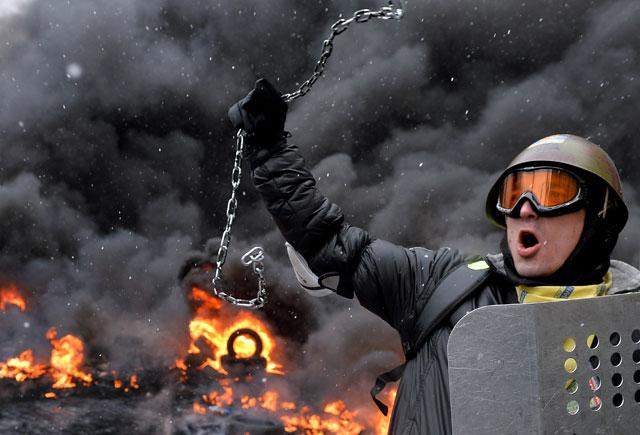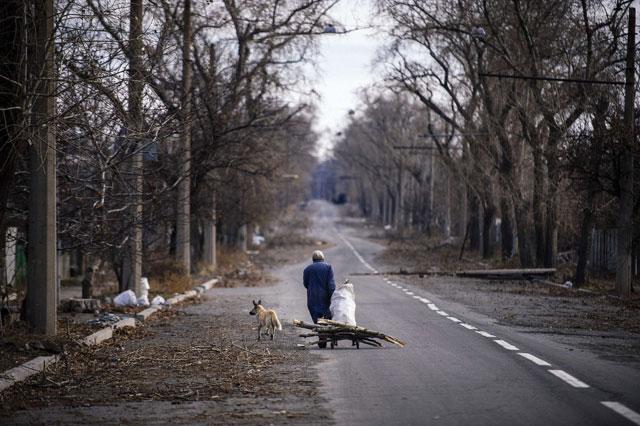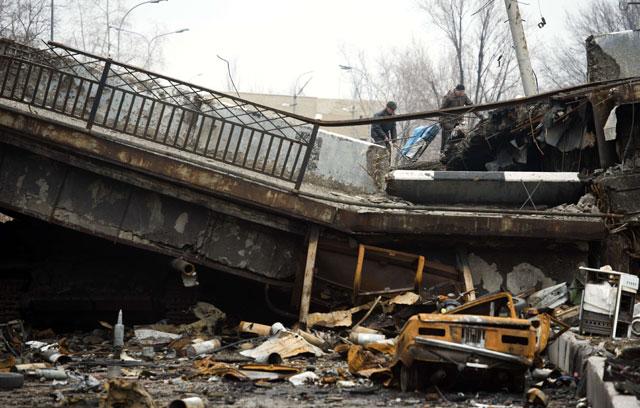You are here
No regrets for protesters who sparked Ukraine revolution
By AFP - Nov 20,2014 - Last updated at Nov 20,2014

KIEV — When Igor Romanenko's friend suggested heading to a gathering on Kiev's Independence Square a year ago Friday, he had no idea he was about to witness the birth of a movement that would change his country forever.
The sandy-haired film director was angry and disappointed at the announcement that then-president Viktor Yanukovych had turned his back on a landmark deal with the European Union in favour of closer ties with Russia.
Like the few hundred others who met there spontaneously that drizzly night of November 21, he remembered Ukraine's Orange Revolution a decade earlier and hoped the government might change its mind on the EU agreement. But he never expected what came next.
"If someone had told me then that in some four months Yanukovych would not be in the country, I wouldn't have believed them," Romanenko told AFP.
In the year since that gathering on the Maidan square, Ukraine has hurtled through a chain reaction of historic upheavals — a revolution, foreign invasion and war which has killed more than 4,100 people in the east of the country.
More lies ahead and the Maidan protesters insist their fight against entrenched corruption has a long way to go yet.
After that first night on the Maidan — the Ukrainian word for square — the protests quickly swelled to tens of thousands.
Brutal police efforts to disperse the demonstrators with batons and teargas backfired and the crowds only got bigger. People quickly started pitching tents.
Soon they were demanding complete change and it looked like they had got it when Yanukovych fled to Russia in February after a crackdown on protesters left more than 100 people dead but failed to end the demonstrations.
Far from the being the end, however, that turned out to be only the beginning of even more upheaval.
In March, Russian troops seized Ukraine's Crimea peninsula. The following month, Kiev launched military operations against Kremlin-backed rebels who seized a string of towns and cities in the east that descended into a bloody war that has splintered the country.
Now Russia and the West are locked in a bitter feud over the crisis that has many warning of a new Cold War which could freeze relations for years.
Despite all the tumult, those involved in that first demonstration say they have no regrets about the events they help set in motion, arguing it was not the protests that caused the ensuing chaos but Moscow's reaction to them.
"Of course I would go again," Romanenko said.
"Like saying that the killing of Franz Ferdinand caused the First World War, saying that Maidan is the reason why there is war is not correct. It was used as a pretext by Russia to act."
A lifetime or a second?
The tents on Maidan disappeared over the summer. In their place stand posters urging support for the Ukrainian army battling pro-Russian rebels in the east and pictures of those killed in the protests.
Looking around the empty square, Liza Tatarinova shook her head at the memory of all that has happened since she stood sipping tea and catching up with friends at that first demonstration a year ago.
"On the one hand it seems like a whole lifetime has passed, but on the other hand life now is so intense that it's difficult to imagine that a year has passed already," the TV producer said.
"With all these events, with all the grief and joy, with all that, it seems like a blink of an eye."
Tatarinova, 34, said the system that they kicked out at was rotten and, although the economic situation has deteriorated, the protest movement had changed Ukraine forever.
"We understand that the economy is bad and we're living worse than before but if you talk about the country as a whole, as a state and identity, then it didn't just get better, it was created," she added.
Ukraine's President Petro Poroshenko this month enshrined November 21 as a Day of Dignity and Freedom and a series of memorial ceremonies are planned on Friday.
But although Ukraine's new pro-Western leaders eventually signed the agreement with the EU, activists say the radical overhaul of the system and the uprooting of corruption they wanted has been stalled by the war.
"It isn't a holiday for me or for the people who will come," Mustafa Nayem, an opposition journalist turned lawmaker who helped to organise the first meeting, told reporters recently.
"Maidan has not finished yet — we are still continuing this story."
Related Articles
Ukraine's government still has options after separatist elections showed its helplessness against a Russian-backed rebellion. The problem: they're all bad.
Tragedy, foul play or fear of prosecution? A spate of mystery suicides by allies of Ukraine's deposed president Viktor Yanukovych has been called all three.
Ukraine marked its independence day on Sunday with a military march-past in Kiev intended to send a message of defiance to Russia, but pro-Moscow rebels countered by parading captured Ukrainian troops through the streets of their main stronghold.













